continued from Eating less to pay the extra ‘tax’
I’ve taken enough of Hayley’s time and decide to check out the bulb planting that I can hear is underway. A table from one of the small offices has been dragged outside into the bright sunshine. Carl and Alan – from Dave’s support group for substance misusers – are giving advice to a small group of enthusiastic residents.
“What are we doing with these then?” one woman asks, with a handful of tulip bulbs.
“Put a few in a pot,” says Alan, “and cover them over with the soil. Give them a drink of water when you get home.”
“I’ll give them a drink of sherry!” laughs the woman.
Another woman, coming out of the mini-mart next door, calls out to someone she knows: “What are you all doing?”
“We’re planting bulbs!” her friend shouts back. “Come and have a go.” And she does.
Karen is here too. She’s from a construction company working with Bolton at Home on the refurbishment of some houses on the estate. Apparently, they have donated all the necessary for today’s activity.
“So, you’re like a fairy godmother,” I suggest, “You can make these things happen?”
“Oh yes, I suppose I am,” she says, passing a bag of Iris Harmony down the table.
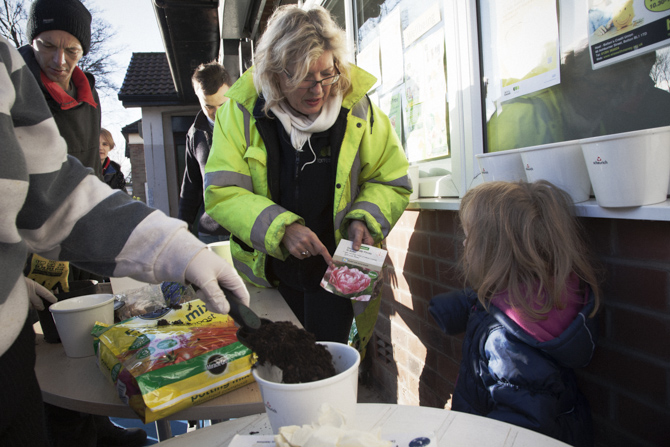
The UCAN is buzzing now, inside and out. Once they’ve planted a few bulbs in their tubs, the customers – almost exclusively women – gather inside where Rosanne is making brews and keeping the banter up. It’s billed as bulb planting but really it’s an opportunity to get to know customers better and continue building relationships.
Once all the pots are filled and the table is cleared away I ask Alan if he can show me the UCAN allotment. Over the last couple of months I’ve heard quite a bit about it and it’s seems appropriate after the bulb planting.
“Is it far?” I ask
“Only round the corner,” he says.
The allotment is pretty much on the next street. We’re down a path of sorts between two houses and then Alan unlocks a gate onto a piece of land bounded by about a dozen back gardens. At first glance it’s clear this allotment has seen better days.
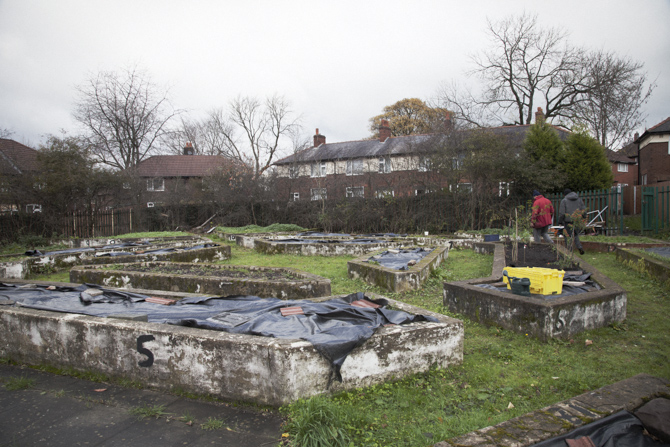
“No one knows it’s here, says Alan, sitting on the side of a cleared bed planting some tulip bulbs he’s brought. “I never knew myself until someone showed me… and I’ve lived round here for years. It’s hidden.”
“And what are you hoping to do with it?”
“I’ve been doing my plot for about eight months now, just keeping on top of it, keeping it going. But I want more from the community to get involved. I’ve tried to get other people interested but it’s hard.”
“You watch, though, as more of them see what you’ve done, then they’ll get interested. You’ll inspire them.”
“Maybe.”
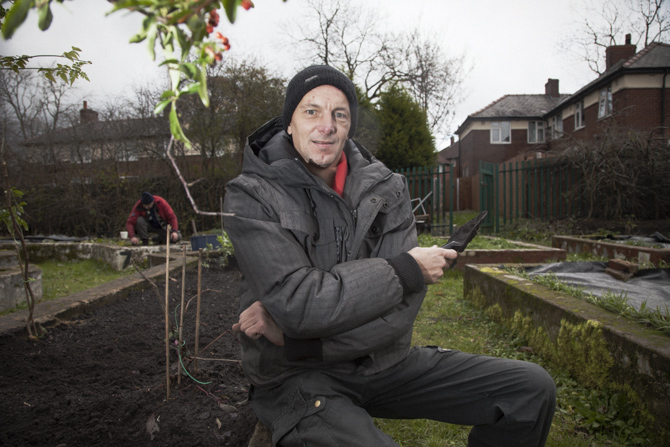
I know Alan is a regular with the support group for alcoholics and drug users and so, as fine rain starts to fall over the allotment, I tentatively ask about his involvement.
“My problem was alcohol,” he says, “but I’m fully recovered now. This sort of project is good for me. It keeps you going, keeps you ticking. Oh, I could to tell you loads of things. But I don’t want to get into that.” I don’t push it.
“So doing this and the UCAN,” – Alan also tends to the space at the back of the offices – “has been good for you?”
“It’s been fantastic for me. They’ve given me support, they’ve given me responsibilities. They’ve put their trust in me.”
The sun’s out again but the drizzle has yet to stop. “There’ll be a rainbow soon,” I say, scanning the sky above the neighbouring rooftops. “And what have you grown on here so far?”
“I’m doing flowers down this end,” says Alan, “and veg done there. I’ve already had some running beans and tried sweetcorn but that died off.”
There’s lots going on in the front room this morning. Bags of soil and stacks of flower pots Vanessa and Carl are discussing whether the bulb planting activity they have planned for later should be out the back or on the pavement at the front. They agree they might attract more people if it’s at the front.
There’s a new member of staff in the kitchen given away by her Bolton at Home lanyard. I introduce myself to Hayley who, it turns out, is a debt advisor. I’ve only just written about Money Matters, the borough-wide debt advice service, and wonder why there’s another one. Seems places like Breightmet can’t get enough money advice.
We takes our mugs into one of the small offices upstairs and Hayley tells me their service, just 15 months old, was set up specifically to cope with the anticipated demand from their customers as the welfare reforms were rolled out. “Although we’re part of Bolton at Home, we’re impartial and we help our customers with all their debt issues.”
“So you’ve seen the direct effect of the cuts and the reforms? I suppose the bedroom tax is a big one?”
“Oh yes,” says Hayley. “People have had to make some serious decisions. Are they willing, or able, to downsize, or are they able to pay the extra from the money they have coming in? We can look at their expenditure on food and fuel to see if they can reduce that a little to free up some money to pay the under occupancy charge.”
“So your customers are having to spend less on food and fuel so they can afford the bedroom tax?”
“Yes, they are.”
“And in Bolton, is there enough housing stock of the right type to re-house customers?”
“That’s really not a question from me but realistically, no. If everybody who was under occupying, turned to us and said they were willing to move then no, we wouldn’t have enough of the right properties to move them to.”
“And then, on the other side of it, do you have an unmet demand from families who are waiting to take on those larger houses?”
“Again, I’m not the right person to answer that question but I suspect not. Ultimately this change is going to have the biggest impact on the customer, but also we as a housing organisation are affected because we’re going to have a lot of properties we’re unable to let.”
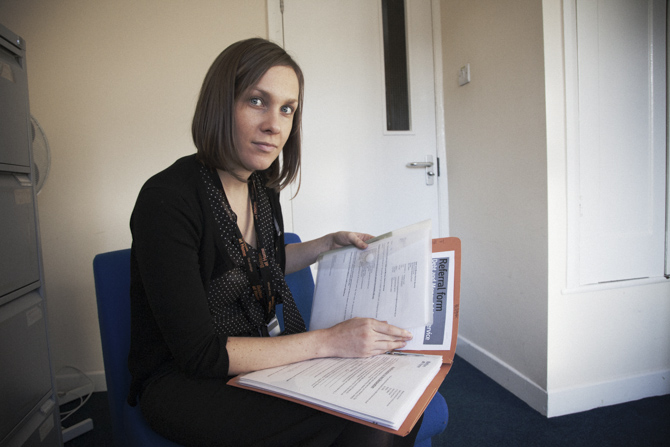
Thinking it must be soul-destroying listening to tales of unmanageable debt I ask Hayley what she gets out of it.
“For me, personally, I find debt advice very rewarding. As advisors – there are six on our team – we find a lot of customers don’t know the difference between priority and non-priority debt. They are making payments to non-priority debts well in excess of the amounts they should be paying.”
“I’m not sure either… what’s a priority debt?”
“One that has serious consequences if you don’t pay. So not paying the rent could lead to eviction, not paying council tax could lead to imprisonment. But the doorstep lender, who gets £20 each week because they come knocking on the door, can only threaten you with the bailiffs.
“The relief on people’s faces when you explain the difference and tell them you can work on their behalf to try and reduce or put on hold the non-priority debt, is very rewarding. We’ll write to the doorstep lender, explain the customer’s position, and that can really reduce the stress they are under.”
to be continued…
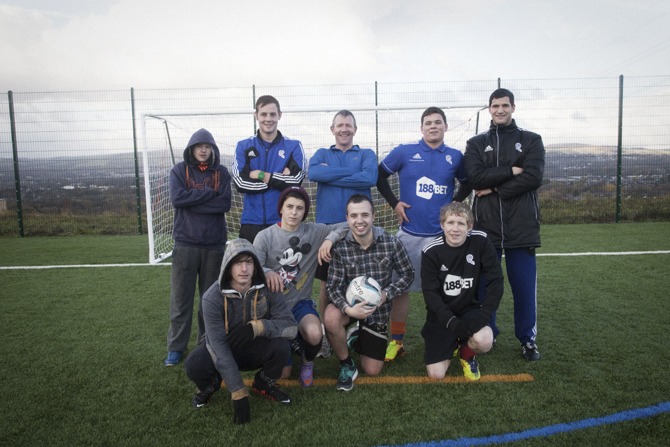
At the UCAN Carl has already changed into his shorts and is pretty much ready to head off to the weekly football session.
We walk together through the estate, my tape recorder held up to his face.
“We want to start looking at men’s health,” he says as I ask him about the sessions, “and it’s not just physical exercise, although that’s important, but we’d like to encourage men to talk about all their health issues. Some of these lads you’ll meet today might be unemployed or have debt issues. So, at first, it’s just an engagement tool really.”
There it is again. Engagement tool. Hitting customers over the head with a debt counselling session or a four-day self-esteem workshop might not be the easiest first step to foster a meaningful long-term relationship, but getting stuck in with a friendly slide tackle could just do the trick.
“Hopefully in the New Year we can start looking at spin-offs,” Carl says. “Maybe DIY courses if that’s something they would like to do.” And there it is again: there’s no 12-month programme already planned out. Everything the UCAN does is tailored to the customers, it’s about doing what they want to do, when they want to do it.
“No, I don’t see that many young men using the UCAN,” I say, “although I’ve seen plenty around the estate.”
“That’s it really,” says Carl, “it’s getting young men to engage with services. They don’t always speak openly about things. But I have noticed, since we’ve been doing the football, that more have been coming into the UCAN.”
“Really?”
“Just to use the computer. They feel comfortable enough to come in and use the computer and that’s a big step.”
We are walking past Bolton St Catherine’s Academy, a new school with views across the town it serves. “This is a magnificent facility,” says Carl. “They do lots of community activities here. When we were looking for a venue for the football they said we could use one of their pitches. And it’s top of the range. It’s 4G.”
“What’s 4G?” I ask, “it sounds like broadband!”
“It’s a bit longer than normal astra turf,” says Carl.
A bus is stopping. A young man with large headphones gets off, his head down.
“You okay?” says Carl, waving a hand towards him. “You coming over? To the footie?”
One side of the headphones is pulled down. “Might do.”
“Yeah. Come over. Starts at one,” Carl says. And then to me: “Some of the lads have been promoting it for us. We’ve had 10 young men off the estate playing football and that’s brilliant after only three weeks.”
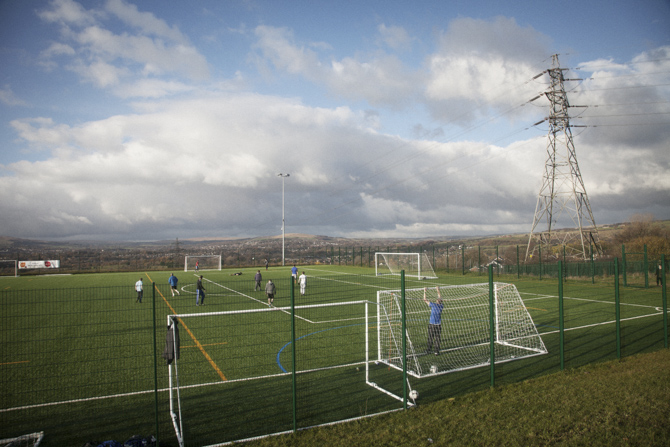
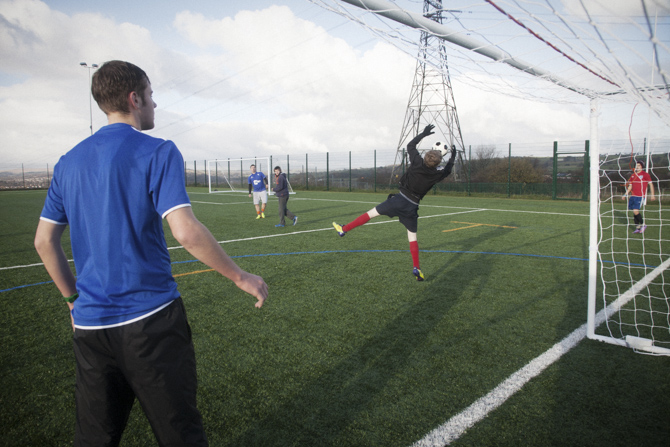
Twenty minutes later, and after a sharp downpour, half a dozen local young men and a handful of staff from both Bolton at Home and Bolton Wanderers are running up and down the 4G, imagining they are at the Reebok or the Camp Nou.
Vanessa pops along to support and gets chatting to the only other spectator, a girlfriend of one of the lads. Within minutes she has encouraged the young woman to pop into the UCAN, have a chat about setting up a woman’s football team and get some advice on returning to college.
One person at a time.
Dave’s come early so we can talk.
He runs the Discovery Group, a weekly support session for substance misusers – recovering alcoholics and drug addicts – and he’s well qualified. “I’ve drunk heavily all my adult life and for 25 years I was dependent on alcohol,” he says, candidly. “I know the pain – I can’t over-emphasise that – and I know the mental processes an addict has to put in place to change the way they think.”
I ask Dave about the circumstances that led him to become an alcoholic. “By 16,” he says, “I had a reputation that was built around being able to drink more than anyone else and I embraced that quite happily.”
He tells me his father was in the trade and drink was readily available, part of everyday life. Yes there were family problems: his parents split and reunited, twice. Dave’s first marriage, to his childhood sweetheart, failed after seven years and his second after 13 years, “There were other issues in both relationships, but fundamentally you can put it down to alcohol,” he says.
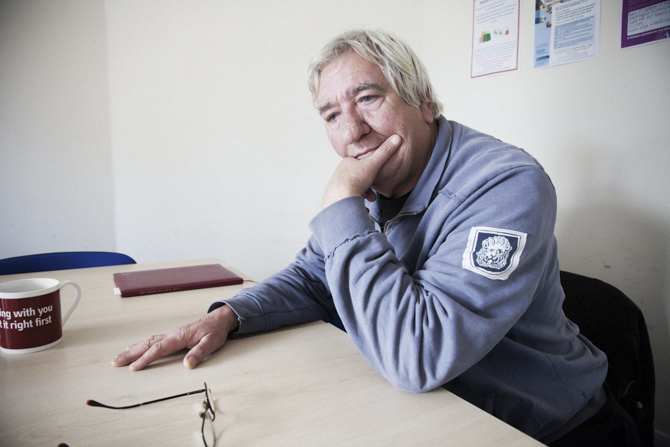
Now retired, he’s still amazed he managed to hold down a job throughout a lifetime of drink. “I would have sacked me, I really would. I wouldn’t have tolerated it.”
Dave’s group grew out of an NHS initiative that was axed due to the cuts. He could see the benefit it was providing to, he concedes, a relatively small number of addicts and he wanted to keep it going as a volunteer.
“It had become part of the routine,” he says, “and routine is vital to recovery. The UCAN offered this room for free and have never asked us for any payment, even for teas and coffees.”
“And why is this different from other groups like NA [Narcotics Anonymous] or AA [Alcoholics Anonymous]?”
“People have to try whatever’s out there. Some support suits some people and not others. Alcoholics Anonymous wasn’t right for me…”
“Why not?” I interrupt.
Dave pauses. “They were asking too much of me,” he says eventually. “Not of anyone else… of me.”
I leave it there. “So do you follow a particular programme with your course?”
“Yes. I’ve written a 12-week programme pulled together from different sources and so one week we might cover self harm, the next we could be discussing putting in place a recovery network of people who can help.”
“And, as a volunteer Dave, you must get something out of this as well? It’s got to be a two-way thing, right?”
“There is no doubt that doing this is good for me. I’d be a liar if I said any different. I’m someone who knows and cares, and yes, there’s a feel-good factor to it.
“I am so proud of being well thought of by all of them here at this UCAN. It’s probably one of the things I’m most proud of. I see them going the extra mile every day. I’ve got a great respect for them and they respect and value what I do too.”
Dave’s attendees have arrived downstairs for the start of this week’s two hour session. “I’ll just grab something to eat and then, if it’s okay, I’ll pop in to be a fly on the wall.”
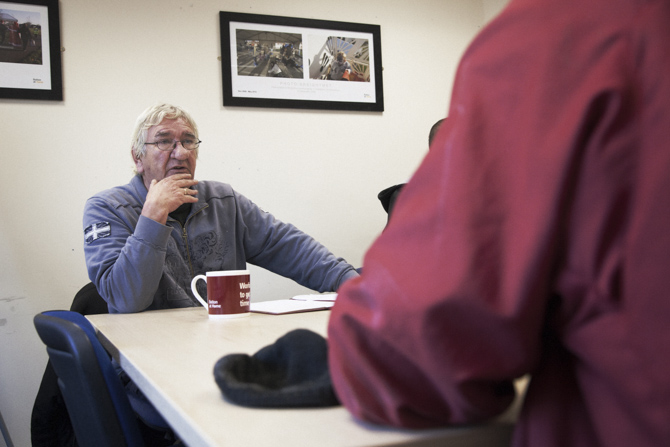
Later I take my camera and recorder into the meeting. Dave is here with Alan, a friendly man I’ve met at the UCAN a few times before and another man I’ll call George. It’s a smaller turnout than usual but that’s the nature of this client group.
They’re talking about children. Forty-year-old George says he’s been having regrets about not starting a family.
“I never had kids,” says Dave, “and I put that down to the drink. Alcohol affects every part of your body. But I don’t regret it. It’s best not to regret. You can spend a lot of time regretting…”









